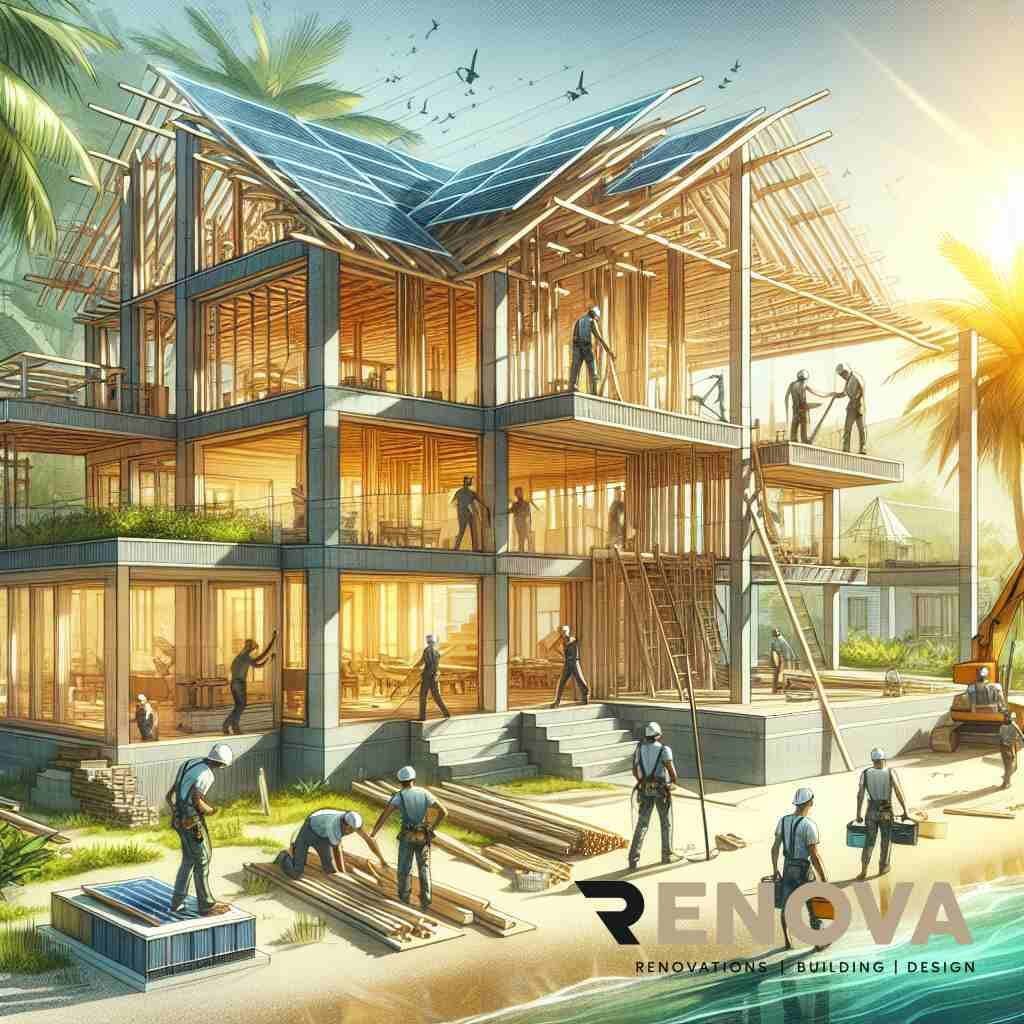Embracing the Future of Construction Management
The evolution of construction management
The field of construction management has undergone substantial transformations over the years, evolving from simplistic approaches relying heavily on manual labor and traditional methods to sophisticated processes benefiting from technological advancements. This evolution is marked by the integration of software, the application of advanced project management techniques, and the adoption of new materials and methodologies. Global construction projects have become more intricately designed and require precise coordination, demanding a shift towards smarter, more efficient ways of managing construction projects. The change is driven by the need for increased efficiency, reduced waste, improved safety, and higher quality outcomes.
Why innovation is crucial in modern construction
Innovation in construction is no longer an option, it’s a necessity. The modern construction landscape is characterized by increasing complexity in projects, tighter schedules, and higher client expectations for sustainability and environmental considerations. Innovations such as BIM in construction management, AI, and modular construction methods address these challenges directly, offering solutions that enhance planning, execution, and monitoring phases. By adopting innovative practices, the construction industry can achieve improved productivity, superior quality, and enhanced safety, all while minimizing environmental impact. This shift not only benefits those directly involved in the construction process but also sets new industry standards that pave the way for future developments.
Understanding RENOVA’s commitment to cutting-edge construction techniques
RENOVA, based in Delray Beach, Florida, exemplifies the embodiment of embracing innovation in construction management. Their commitment to cutting-edge construction techniques is evident in their diverse portfolio, featuring projects that illustrate pioneering use of materials, sustainability practices, and advanced project management tools. RENOVA’s approach goes beyond traditional practices, leveraging the latest construction technologies and methodologies to exceed client expectations. This commitment ensures that each project, whether it’s new construction or a sophisticated renovation, benefits from optimized processes, leading to timely completion, cost efficiency, and unparalleled quality. Through this dedication to innovation, RENOVA continues to lead the way in transforming the landscape of construction in South Florida and beyond.
Advanced Technologies Reshaping Construction
The dawn of advanced technologies in the construction sector has ushered in a new era marked by efficiency, safety, and unprecedented innovation. These technologies not only streamline project execution but significantly enhance precision in the planning, development, and maintenance phases of construction projects. Embracing these changes, RENOVA stands at the forefront, implementing state-of-the-art solutions across its operations in South Florida. Below, we delve into some of these transformative technologies that are reshaping the construction landscape.
AI in construction and its impact
Artificial Intelligence (AI) has begun to play a pivotal role in optimizing construction processes, from automated design to predictive analytics for project management. AI applications in construction enable real-time decision-making, efficient resource allocation, and risk mitigation, ensuring projects are completed on time and within budget. Among its vast capabilities, AI in construction enhances quality control, safety monitoring, and construction scheduling. For example, by analyzing data from past and ongoing projects, AI can predict potential delays or safety hazards, allowing for preemptive action. RENOVA integrates AI tools into its construction management innovations, harnessing data-driven insights to streamline workflow and improve project outcomes.
The transformative power of 3D printing in construction
3D printing technology has revolutionized the construction industry by enabling the rapid prototyping and production of construction components, often at a fraction of the time and cost of traditional methods. This technology promotes customizability and flexibility in design, allowing for intricate details and complex geometries. The use of 3D printing in construction reduces waste, minimizes labor requirements, and can significantly accelerate construction timelines. In line with 3D printing in construction, RENOVA explores innovative applications of this technology to create sustainable and efficient building solutions, from individual custom components to entire structures, showcasing the potential for enhanced architectural designs and eco-friendly construction approaches.
Drone technology for enhanced real-time construction monitoring
Drones have become invaluable tools in construction, offering a bird’s-eye view for real-time monitoring, progress tracking, and inspection of sites. This aerial perspective aids in creating accurate site surveys, mapping, and understanding the topography, which is crucial for planning and executing construction projects effectively. Drones equipped with cameras and sensors can capture detailed images and data, helping identify issues early on, improve safety, and ensure compliance with project specifications. RENOVA leverages drone technology for enhanced real-time construction monitoring, maximizing efficiency and enabling proactive management of projects, from residential home renovations to large-scale new constructions.
Virtual reality in construction planning
Virtual Reality (VR) has emerged as a powerful tool in construction planning, offering immersive visualizations that enhance the understanding of architectural designs and project plans. By creating a 3D environment, stakeholders can virtually walk through a construction site, assess designs, and make informed decisions before actual construction begins. This capability facilitates better communication between clients, architects, and contractors, reducing errors and misunderstandings. Moreover, VR in construction planning allows for adjustment and optimization of designs in real time, significantly improving project outcomes. Through the adaptation of virtual reality in construction planning, RENOVA not only ensures accuracy and efficiency but also enriches the customer experience, bringing clients’ visions to life with precision and creativity.
Sustainable Practices and Green Building Innovations

The construction industry is witnessing a significant shift towards sustainability, responding to the pressing need for environmental conservation and energy efficiency. This transition is not just about adhering to regulations, it’s about embracing a future where construction practices harmonize with the planet’s ecological balance. In this light, sustainable practices and green building innovations stand out as fundamental pillars in today’s construction projects, driving the industry towards a greener, more sustainable future.
Energy-efficient construction methods
Energy efficiency in construction involves adopting practices and technologies that reduce energy consumption during the building process and throughout the lifecycle of a building. From the incorporation of high-efficiency HVAC systems and LED lighting to the installation of thermal insulation and energy-recovery ventilators, these methods aim to minimize the carbon footprint of new buildings and renovations alike. RENOVA, a key player in this paradigm shift, employs energy-efficient construction methods not only to meet the growing demand for green buildings but also to set a benchmark in the realm of sustainable construction practices. By integrating advanced building materials known for their superior thermal properties, RENOVA ensures that every project, whether a custom home or a commercial facility, sets a standard for energy conservation.
Green building certifications shaping the future
Green building certifications such as LEED, BREEAM, and Energy Star are becoming increasingly important in the construction industry. These certifications serve as benchmarks for sustainable building practices, ensuring that structures not only adhere to high environmental standards but also contribute positively to the health and wellbeing of their occupants. Achieving such certifications requires a holistic approach to construction, encompassing everything from site selection and materials used to water efficiency and indoor environmental quality. RENOVA recognizes the pivotal role these certifications play in shaping the future of construction. By actively pursuing green building certifications for its projects, RENOVA not only demonstrates its commitment to sustainability but also helps elevate the market value and appeal of the properties it develops, thus contributing to a sustainable future.
The role of sustainable construction practices in South Florida
South Florida’s unique habitat, characterized by its rich biodiversity and distinctive ecosystems, presents both opportunities and challenges for sustainable construction. The region’s susceptibility to climate change effects, such as rising sea levels and hurricanes, calls for an innovative approach to construction that not only mitigates environmental impact but also enhances resilience. Sustainable construction practices, from leveraging sustainable construction practices such as green roofing and native landscaping to adopting energy-efficient building designs, are vital in creating structures that can withstand the test of time and nature. RENOVA, with its profound understanding of South Florida’s climate and ecological requirements, is at the forefront of integrating sustainable solutions into its construction projects. This commitment ensures that every building not only contributes to reducing the carbon footprint but also stands as a testament to the possibilities of harmonious coexistence between human innovation and the natural world.
Efficiency and Productivity Tools for Construction Management
The landscape of construction management is continually evolving with the integration of various technology-driven solutions aimed at enhancing efficiency and productivity. These tools not only streamline project workflows but also provide tangible benefits in terms of time, cost savings, and overall project quality. RENOVA, a leading general contractor based in Delray Beach, Florida, is at the forefront of this transformation, incorporating the latest tools and techniques to deliver exceptional results for their clients.
Construction Productivity Software that Drives Results
The adoption of construction productivity software has become a game-changer for the construction industry, enabling teams to work more efficiently and cohesively. This kind of software facilitates project management, document control, communication between stakeholder, scheduling, and budget management. RENOVA leverages these tools to ensure that every phase of the construction process, from initial planning to final delivery, is executed with precision and efficiency. By integrating cutting-edge productivity software, RENOVA can provide real-time updates, streamline collaboration among team members, and minimize delays, thereby driving positive outcomes on all construction projects.
Construction productivity software revolutionizes the traditional approach to construction management by automating manual processes, reducing the likelihood of human error, and enabling data-driven decision-making. The result is a smoother construction process with enhanced accountability and transparency, which ultimately leads to higher client satisfaction and project success.
Leveraging BIM in Construction Management for Optimal Outcomes
Building Information Modeling (BIM) represents another significant leap forward in construction management innovations. BIM transcends traditional blueprints and spreadsheets, offering a dynamic, 3D model-based process that gives architecture, engineering, and construction professionals the tools and insight to more efficiently plan, design, manage, and construct buildings and infrastructure.
At RENOVA, the utilization of BIM in construction management has dramatically improved project visualization, coordination, and simulation during the entire project lifecycle. This approach enables the RENOVA team to anticipate and address potential issues before they occur on the physical job site, fostering a proactive versus reactive management style. Through BIM’s comprehensive tools, projects benefit from enhanced coordination among subcontractors, reduced waste, and tighter project schedules-ensuring that every custom home or renovation project is completed to the highest standards of quality and efficiency.
Construction Project Scheduling Software Essentials
Effective project management in construction is incomplete without robust scheduling software. Such platforms enhance the ability to plan, monitor progress, and identify potential delays or conflicts in real-time. RENOVA incorporates construction project scheduling software essentials into its workflow to ensure that all aspects of the project are aligned with the planned timeline and milestones.
This software empowers RENOVA’s construction managers to allocate resources optimally, adjust schedules dynamically in response to unforeseen changes or delays, and maintain constant communication with all project stakeholders. The benefit of incorporating these tools is a more predictable project timeline, maximized resource efficiency, and minimized downtime, all of which contribute significantly to the timely and cost-effective completion of projects.
By embracing these efficiency and productivity tools, RENOVA sets itself apart as a leader in construction management, constantly pushing the boundaries of what is possible in the realm of construction. Through strategic implementation of these innovations, RENOVA not only enhances its operational efficiency but also significantly improves the value delivered to clients, underscoring its position as the go-to general contractor and construction company in South Florida.
Safety and Compliance Innovations
Wearable tech in construction safety
The introduction of wearable technology into construction sites marks a significant leap forward in ensuring worker safety. Devices such as smart helmets, exosuits, and biometric monitors are becoming more commonplace, revolutionizing the way safety protocols are implemented. These wearables can monitor vital signs, detect falls, and even alert workers to hazardous conditions in real-time. For companies like RENOVA, incorporating wearable tech in construction safety reflects a commitment to utilizing cutting-edge tools to safeguard their workforce. This proactive approach minimizes risks and enhances the overall safety culture within the industry, setting new benchmarks for protection and compliance on construction sites.
Safety innovations in construction to protect workers
Innovations in safety are continually reshaping construction sites into safer environments for workers. Beyond wearable tech, advancements include autonomous drones for site inspections, robotics for heavy or dangerous tasks, and augmented reality for safety training simulations. These technologies reduce human exposure to high-risk situations and provide immersive training experiences that prepare workers for real-life hazards without putting them in harm’s way. RENOVA is leading the charge by integrating these safety innovations into their projects. Their commitment demonstrates how prioritizing worker safety through innovative solutions not only complies with but exceeds industry standards, contributing to a reduction in workplace accidents and injuries.
Ensuring compliance with modern safety standards
Navigating the regulatory landscape of construction safety standards is a complex but necessary aspect of the industry. With rules and guidelines continually evolving, keeping up-to-date with the most current standards is crucial. Compliance software and management systems play an integral role in this process, offering platforms for monitoring, reporting, and ensuring that projects adhere to safety, environmental, and health regulations. RENOVA leverages such tools to streamline compliance processes, ensuring that every project, from custom homes to large commercial builds, meets modern safety standards. This rigorous adherence not only underscores RENOVA’s commitment to excellence but also solidifies its reputation as a leader in construction management innovations, dedicated to upholding the highest levels of safety and regulatory compliance in the industry.
New Construction Methods and Materials
The continual evolution of the construction industry has brought to the fore innovative methods and materials that promise to redefine the standards of building design, efficiency, and sustainability. Among these transformative approaches, modular construction, advanced building materials, and off-site construction methods stand out for their potential to significantly impact cost, timelines, and environmental footprints. RENOVA, a leading general contractor in South Florida, is at the forefront of integrating these modern methodologies into its workflow, thereby setting a new benchmark in the construction sector.
Exploring the benefits of modular construction
Modular construction is reshaping the landscape of the construction industry with its myriad benefits, ranging from reduced construction times to enhanced quality control and sustainability. This method involves prefabricated building sections or modules off-site in a controlled factory environment, which are then transported to the final construction site for assembly. This process not only minimizes waste and site disturbances but also offers the flexibility of customization while adhering to the same codes and standards as traditionally built structures.
RENOVA has recognized the modular construction benefits and has adeptly incorporated this approach into many of its projects. The move towards modular construction aligns with the company’s commitment to innovation, efficiency, and sustainability within the construction process. Clients benefit from faster project completion times, lower overall costs, and higher quality finishes, making it a win-win approach for all stakeholders involved.
Advanced building materials for today’s custom homes
The use of advanced building materials is another trend significantly influencing the construction industry. Innovations in materials science have led to the development of products that are not only stronger and more durable but also offer enhanced energy efficiency and environmental benefits. From self-healing concrete to translucent wood and aerogels, these futuristic materials are enabling architects and builders to push the limits of design and functionality.
As a licensed general contractor known for its high-quality custom homes, RENOVA has seamlessly integrated the use of advanced building materials into its projects. These materials contribute to the aesthetic appeal, longevity, and energy efficiency of homes, thereby enhancing the overall living experience for homeowners. Moreover, their use supports RENOVA’s dedication to sustainable construction practices, emphasizing the company’s role in paving the way for a greener and more innovative construction industry.
Off-site construction methods revolutionizing new construction
Off-site construction is another revolutionary approach gaining traction in the industry. Similar to modular construction, this method involves the prefabrication of building components at a factory location, which are later assembled on-site. The benefits of off-site construction include improved work quality, reduced waste, expedited project timelines, and decreased labor costs. This method also allows for construction to proceed concurrently with site and foundation work, further shortening project durations.
RENOVA, always at the cutting edge of construction innovations, has adopted off-site construction methods to deliver projects that are not only time and cost-efficient but also superior in quality. By leveraging off-site construction, RENOVA can better manage project schedules and budgets, ensuring that clients receive the best possible outcomes. This forward-thinking approach underscores RENOVA’s commitment to leveraging modern construction techniques to achieve unparalleled results in every project undertaken.
Through the integration of modular construction, the utilization of advanced building materials, and the adoption of off-site construction methods, RENOVA continues to lead the charge in transforming the construction landscape in South Florida. Such innovations not only streamline the construction process but also contribute to building more resilient, sustainable, and aesthetically pleasing structures, marking a significant step forward in the evolution of construction management.
Project Delivery and Management Excellence

Integrated project delivery in construction
Integrated Project Delivery (IPD) represents a progressive and collaborative approach to construction that unites people, systems, business structures, and practices into a process that harnesses the talents and insights of all participants. This method optimizes project results, increases value to the owner, reduces waste, and maximizes efficiency throughout all phases of design, fabrication, and construction.
RENOVA excels in utilizing IPD by fostering a culture of collaboration among architects, engineers, contractors, and stakeholders from the project’s inception. This collective approach ensures that decisions are made with a comprehensive understanding of their impacts on cost, schedule, and quality. By involving all team members early in the project, RENOVA enables a seamless integration of diverse expertise that leads to innovative solutions, mitigates risks, and enhances the project’s overall outcomes.
The importance of lean construction techniques
Lean construction techniques are reshaping the construction industry by focusing on reducing waste, improving efficiency, and maximizing value to the client. These methodologies are derived from lean management principles, emphasizing the importance of considering construction as a production system. Key components of lean construction include design optimization, effective supply chain management, and a continuous improvement ethos.
At RENOVA, the adoption of lean construction techniques is pivotal to streamlining processes, reducing costs, and delivering projects on or ahead of schedule. Strategies such as Last Planner System (LPS), value stream mapping, and just-in-time delivery of materials are employed to ensure that every aspect of construction is optimized for peak efficiency. This commitment to lean principles underscores RENOVA’s dedication to excellence, ensuring that projects are not only completed efficiently but also uphold the highest quality standards.
How RENOVA excels in construction management and client satisfaction
RENOVA’s excellence in construction management is grounded in a holistic approach that integrates advanced project management tools, a commitment to communication, and a deep understanding of client needs. Their use of top-tier construction management software solutions and methodologies ensures that projects are meticulously planned, executed, and monitored to guarantee timely completion and adherence to budgetary constraints.
Client satisfaction remains at the heart of RENOVA’s operations. Regular updates and transparent communication ensure that clients are kept in the loop at every stage of their project. This emphasis on client engagement fosters trust and reassures clients of RENOVA’s commitment to their vision. Moreover, by tailoring their approach to meet each client’s unique requirements and concerns, RENOVA not only meets but often exceeds client expectations, cementing their status as a trusted general contractor in South Florida known for its unrivaled construction management and exceptional customer service.
Building the Future with RENOVA
How Smart Construction Sites Pave the Way for Innovation
Smart construction sites are transforming the construction industry by introducing a level of efficiency and accuracy unseen in traditional construction practices. These sites are underpinned by a network of Internet of Things (IoT) devices, sensors, and real-time data analytics platforms that monitor every aspect of the construction process. This digital ecosystem enables immediate adjustments, reducing downtime and streamlining workflows.
RENOVA harnesses the power of smart construction sites to foster innovation within its projects. By integrating sophisticated analytics and IoT technologies, RENOVA can preemptively identify potential issues, optimize resource allocation, and ensure projects adhere strictly to timelines and budgets. This proactive approach not only enhances the construction process but also improves the overall quality and sustainability of the build, positioning RENOVA as a frontrunner in leveraging technology for construction innovation.
Moreover, smart construction sites facilitate better communication among team members, ensuring that everyone, from architects to subcontractors, is on the same page. The use of real-time data empowers decision-makers, allowing for a more agile and responsive construction management approach. Through the implementation of these cutting-edge technologies, RENOVA is not just building structures, it’s constructing the future of the residential and commercial landscape in South Florida.
Construction Automation: A Tool for Efficiency
In today’s fast-paced construction industry, construction automation stands out as a critical tool for enhancing efficiency and productivity. Leveraging robotics, AI, and machine learning, automation streamlines repetitive tasks, enhances precision, and significantly reduces the margin for error. This not only accelerates project timelines but also frees up human workers to focus on more complex and nuanced aspects of the construction process.
RENOVA is at the forefront of integrating construction automation within its operations. From automated survey drones that map out construction sites with pinpoint accuracy to robotic arms that perform precise, labor-intensive tasks, RENOVA’s embrace of automation technology ensures that projects are not only completed more swiftly but also with an enhanced level of quality and safety.
Construction automation also contributes to a safer work environment by assuming responsibility for high-risk tasks, thus minimizing on-site accidents and ensuring compliance with safety standards. By championing these innovative solutions, RENOVA not only demonstrates its commitment to excellence and efficiency in construction projects but also underscores its role as a leader in adopting revolutionary technologies that redefine industry standards.
Navigating Construction Industry Trends 2023 with RENOVA
As we move into 2023, the construction industry continues to evolve, shaped by emerging trends such as sustainability, digital transformation, and a heightened emphasis on resilience and adaptability post-pandemic. Navigating these trends requires a deep understanding of the market, foresight, and an unwavering commitment to innovation and quality. RENOVA, with its pulse on the latest industry developments, stands prepared to embrace these challenges and opportunities, leading the wave of transformation in South Florida’s construction landscape.
Sustainability remains at the forefront, with an increasing demand for green building practices and materials that reduce environmental impact. RENOVA’s dedication to sustainable construction is evident in its commitment to energy-efficient construction methods, green building certifications, and the incorporation of renewable energy systems into new builds and renovations. This not only aligns with environmental objectives but also meets the evolving expectations of clients seeking eco-friendly and cost-effective solutions.
Digital transformation, powered by BIM, AI, and advanced project management software, continues to redefine project delivery and management. RENOVA’s adept use of these technologies ensures optimal efficiency, accuracy, and client satisfaction. By staying ahead of the curve in adopting these innovations, RENOVA not only enhances its operational capabilities but also sets new benchmarks for excellence in construction management.
Navigating the dynamic construction industry landscape requires agility, expertise, and a visionary approach. RENOVA’s unwavering commitment to embracing and leading change positions it as a trusted partner for those venturing into new construction or renovation projects in 2023 and beyond.
Through intelligent construction sites, the adoption of automation, and a strategic approach to industry trends, RENOVA is not just keeping pace with the future of construction management-it’s defining it.








